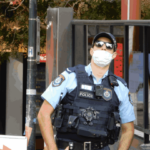Senator Thorpe Introduces Bill to Facilitate the Prosecution of Genocide Domestically

Right now, those opposing the Albanese government’s support of Israel in its military assault on the 2.3 million Palestinians trapped in the 41 kilometre long and at its widest 12 kilometre wide walled-in Gaza Strip, are discussing the potential for local prosecutions of ministers complicit in this atrocity.
The Albanese government last week voted down a Greens motion calling for an immediate ceasefire, with assistant foreign minister Tim Watts continuing to frame the slaughter, which the International Court of Law has ruled is a plausible genocide, as Israel exercising its “right to defend itself”.
The reason why such action is being contemplated locally is that genocide, crimes against humanity and war crime offences appear in federal criminal law, which can be prosecuted locally and have universal jurisdiction, meaning they can apply to crimes perpetrated anywhere across the planet.
But whilst these offences are contained in the Criminal Code Act 1995 (Cth) for the purpose of domestic prosecutions, in order to launch such a trial, the Australian attorney general is currently required to sign off on it or it can’t pass go.
So, in identifying this as an issue to taking such legal action against reigning Australian government ministers, Senator Lidia Thorpe introduced a bill into the upper house to repeal this atrocity crime prosecution block, on the same day the lower house voted down the Greens ceasefire motion.
The attorney general’s fiat
“These changes facilitate truth telling and accountability, without which, there will be no change,” Senator Thorpe said, during her second reading speech on the Criminal Code Amendment (Genocide, Crimes Against Humanity and War Crimes) Bill 2024 (the Genocide Bill).
“Unless governments commit and choose to be held, and hold others accountable, crimes against humanity, genocide, war crimes, suffering and mass death will happen again, over and over again,” the Gunnai Gunditjmara and Djab Wurrung woman continued in relation to the timely legislation.
Thorpe explained that this is part of a suite of powers known as the attorney general’s fiat. And she further noted that the work of scholars suggests that this nation might be reluctant to recognise and prosecute genocide in particular, due to the impact of colonisation on this continent.
The office of the senator representing the nation’s Blak Sovereign movement, points out that two Australian chief lawmakers have denied atrocity crime prosecutions against foreign nationals in the past.
Then AG Christian Porter refused a prosecution against then Myanmar state counsellor Aung San Suu Kyi over atrocity crimes against the Rohingya in 2018, while then AG Robert McCelland blocked the 2011 trialling of then Sri Lankan PM Mahinda Rajapaksa over atrocities against the Eelam Tamils.
“Being able to commence proceedings… without the real or perceived bias of political priorities influencing government decision-making in both the domestic and international area, increases trust in government… and increases transparency, accountability and democracy,” Thorpe made clear.
The guts of the bill
The explanatory memorandum relating to the Genocide Bill states that the legislation is in “recognition of Australia’s failure to fully implement the 1948 Convention on the Prevention and Punishment of the Crime of Genocide” (the Genocide Convention), of which it ratified in 1951.
Article I of the Genocide Convention requires nations a party to it to “undertake to prevent and to punish” a genocide that’s taking place, and in finding there’s a plausible genocide in Gaza, the 26 January ruling of the ICJ triggers the obligation on all party states to prevent the crime of genocide.
Thorpe’s bill repeals sections 268.121 and 268.122 of the Criminal Code. The first section provides that the attorney general can prevent an atrocity crime prosecution from commencing without their written authorisation, whilst the latter stipulates that such a decision can’t be reversed.
As Australia ratified the Rome Statute on 1 July 2002, which established the International Criminal Court, and contains the four core international crimes of genocide, crimes against humanity, war crimes and since 2010 amendments, the crimes of aggression.
On ratification Australia was required to enact all forms of the initial three atrocity crimes into federal law, where they have sat under division 268 of the Criminal Code since September 2002.
The five forms of genocide are the attempt to destroy a group, in part or in whole, via killing, causing serious harm, inflicting destructive life conditions, preventing births and the forcible transfer of children, and they sit all within sections 268.3 through to 268.7 of the Criminal Code.
In its interim ruling regarding the South African genocide case against Israel, the ICJ found that the Netanyahu government is plausibly perpetrating the first four forms of the international crime in Gaza right now.
“Given the potential conflict of interest of any government or its agencies or representatives to be involved in the alleged crimes, such a fiat prevents the rule of law, including but not limited to the Convention to operate as intended,” explains the memorandum, and this has global implications.
Potential local prosecutions
UWA law professor Dr Melanie O’Brien has asserted that “states may be unwilling to recognise a genocide because of the potential repercussions… on relations with the perpetrator state”, while Young Australians International Affairs’ Ellen Van Beukering suggests reasons for local reluctance.
Beukering, a foreign policy fellow, wrote in a 2021 article, that parliament voted down a motion by then Senator Rex Patrick recognising that China is perpetrating genocide against the Uyghurs, as such acknowledgement may trigger legal repercussions relating to First Nations genocide.
The settler colonial project perpetrated on this continent has seen the destruction of First Nations peoples’ way of life and their mass killing and displacement. And Thorpe raises the point that certain ongoing practices occurring under the Australian state might constitute genocide now.
In regard to atrocities in western China, the independent Uyghur Tribunal ruled in December 2021, that genocide is being perpetrated upon the Uyghur people in the form of imposing measures designed to prevent birth, which included mandatory sterilisations and forced abortions.
As for how genocide may be occurring currently in this country, Thorpe points to the ongoing removal of Aboriginal children, which many consider a continuation of the Stolen Generations. And the Bringing Them Home report found removals last century were carried out with genocidal intent.
The 2024 Productivity Commission Report states that of the 27,969 children aged between 2 and 17 years old in out-of-home care for at least two years in June 2023, 12,320, or 44 percent of them, were Aboriginal kids, yet First Nations children only account for about 6 percent of all local youths.
Complicit in genocide
Prime minister Anthony Albanese released another joint statement with his Canadian and New Zealand counterparts on Thursday, calling for an immediate humanitarian ceasefire, and they somewhat tellingly referred to the ICJ ruling, and noted it’s requirement that Israel resume aid is “binding”.
However, while the PMs condemned Hamas for its 7 October killings, they refrained from doing the same to Tel Aviv over the murder of more than 28,000 Palestinians over the last four months. And nor do they mention that Canberra and Ottawa have currently cut off financing the main aid channel into Gaza.
Proceedings have been commenced in the US and the UK as lawyers attempt to prosecute local government ministers over complicity in the Gaza genocide. And the South African lawyers who brought the ICJ case against Israel plan to launch a complicity case against the US and the UK.
Foreign minister Penny Wong cut off support to UNWRA, the UN agency for Palestinian refugees, that’s the main aid supply line into Gaza, which has been identified as the site of a plausible genocide, where mass starvation is underway, as Israel cut off food and water supply in October.
The head of UNWRA has described the action, based on unsubstantiated claims, as collective punishment, and whilst this does not appear as a standalone offence in domestic law, the various genocide offences likely capture the crime of punishing an entire group for the actions of some.
Thorpe’s Genocide Bill has been sent to the Senate Legal and Constitutional Affairs Legislation Committee to undergo review, and it will report back on whether attorney general fiat should be removed from federal atrocity crimes in November.
“No politician should get to say who can and can’t be held accountable in our legal system, particularly in relation to the most heinous crimes like genocide,” the senator said in a press release on the day prior to introducing her genocide legislation.
“Whether you’re a Palestinian Australian who has seen your family murdered in Gaza, or a Blak Mother wanting to hold this government to account for the ongoing removal of First Nations children, my bill will give people in this country a better chance for justice,” she concluded.







